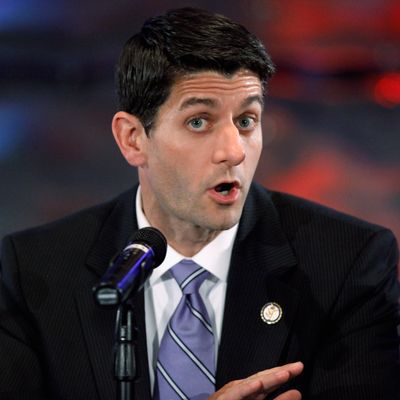
Paul Ryan recently attacked the Obama administration’s economic policies for, supposedly, exacerbating income inequality. I deemed this the most shameless thing Ryan has ever said, given that (1) Obama has actually enacted a wide range of inequality-reducing policies; (2) Ryan has opposed every one of them; and (3) Ryan has proposed a set of alternative policies that would have enacted the greatest upward transfer of income in American history.
New York Times reporter Jonathan Weisman implies that my characterization of Ryan is unfair. Here is Weisman’s less stark characterization of Ryan’s ideology:
Liberal activists still love to bash Mr. Ryan. In New York Magazine this month, Jonathan Chait wrote that “Ryan’s long and distinguished career in the field of shamelessness” had reached a new pinnacle when he told The New York Times that Mr. Obama’s policies had exacerbated wage stagnation and income inequality, even as he ardently opposed White House efforts to raise taxes on the rich to finance programs to stabilize incomes of the poor and middle class.
In truth, Mr. Ryan is far less tribal than many House Republicans. For a recent interview, Mr. Ryan, decked out in a dark suit for an appearance on the NBC program “Meet the Press,” asked to meet at the Politics and Prose bookstore in Northwest Washington, often a gathering place for liberals.
For the record, I am a liberal opinion journalist, not a “liberal activist.” As an opinion journalist, I try, without concealing my own ideological preferences, to weigh my conclusions on the basis of the available facts. My analysis is that Ryan has dedicated his entire public career to the proposition that the government takes too much from the rich and gives too much to the poor. This belief is evident in his repeated demonstrations (before it became a political liability) of the profound influence of Ayn Rand upon his thinking. It is also evident in his entire legislative career, from his Bush-era history as friendly critic urging the administration to embrace even more regressive and fiscally irresponsible tax cuts and Social Security privatization than it advocated, to his Obama-era incarnation as advocate of a massive program of upward redistribution of income. Against this, Weisman presents a contrary analysis, the factual basis for which is that Ryan held an interview in a bookstore.
Implicit in Weisman’s presentation of his competing analysis is that he, an objective journalist rather than a “liberal activist,” has a fairer point of view (which he introduces, “In truth …”). But whether Ryan’s decision to hold an interview in a bookstore frequented by liberals tells us anything important about his public philosophy is, at the very least, open to debate. Possibly Ryan enjoys the atmosphere of a great bookstore enough to be unbothered by the presence of liberal Democrats (who make up the majority of the crowd in nearly any public location in Washington). Or perhaps he is aware that journalists like Weisman will interpret his decision to hold an interview at Politics & Prose as a sign of ideological flexibility, and thus considers it a clever, low-cost way to generate positive coverage without compromising his ideological goals.
If Ryan is unaware of this journalistic dynamic, he has the good fortune to wander innocently into it time after time. New York Times columnist James Stewart came away from an interview convinced of Ryan’s willingness to raise capital gains taxes despite his fervent and explicit opposition to such a policy. BuzzFeed’s McKay Coppins was likewise persuaded of Ryan’s deep and heartfelt commitment to fighting poverty. All the journalists reaching these conclusions seem to find evidence for these conclusions, which lie so diametrically opposed to Ryan’s voting record, in other gestures: visits with the poor, a sincere-sounding affect, a visit to a bookstore. Sometimes they read an ideological softening into Ryan’s vague promises of such future compromise, which is always unspecified and lies just over the horizon. They are likewise convinced that the only basis for challenging their conclusion is rabid personal animosity toward Ryan.






























